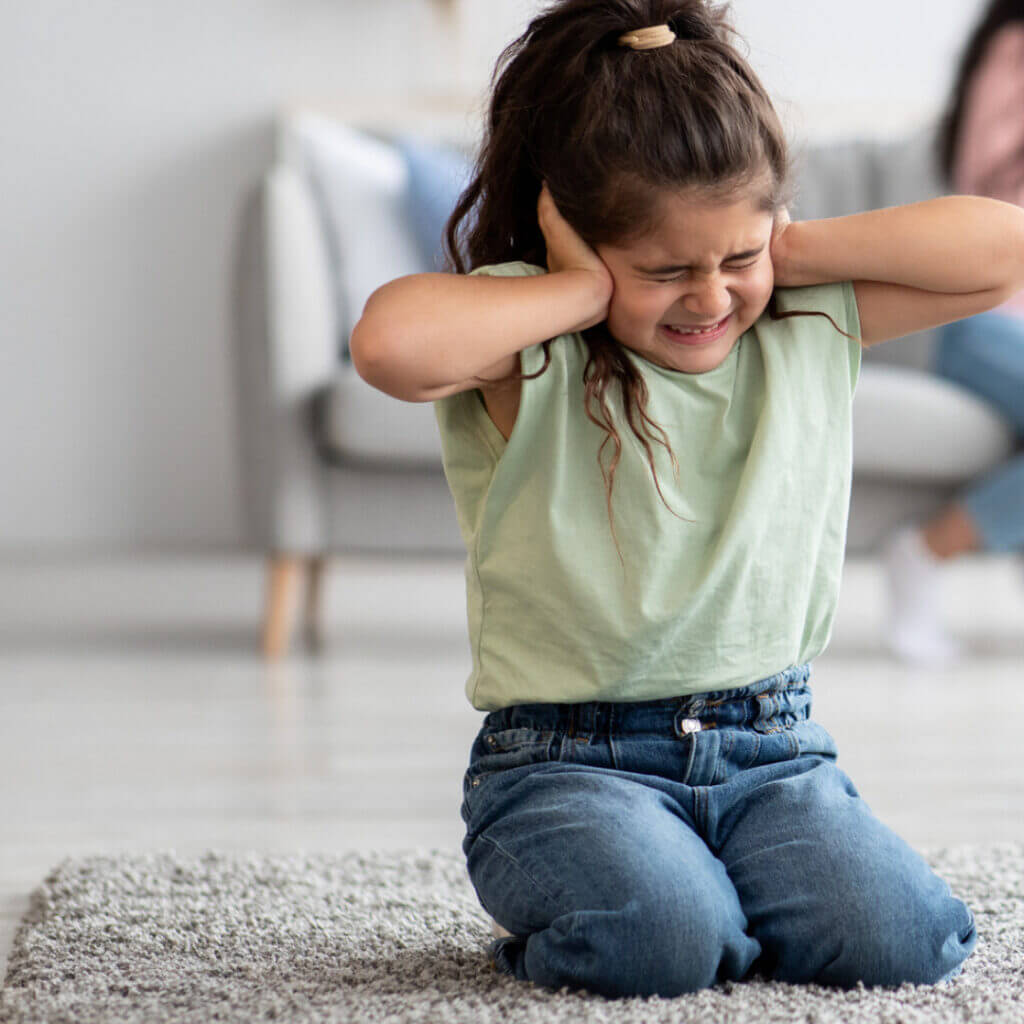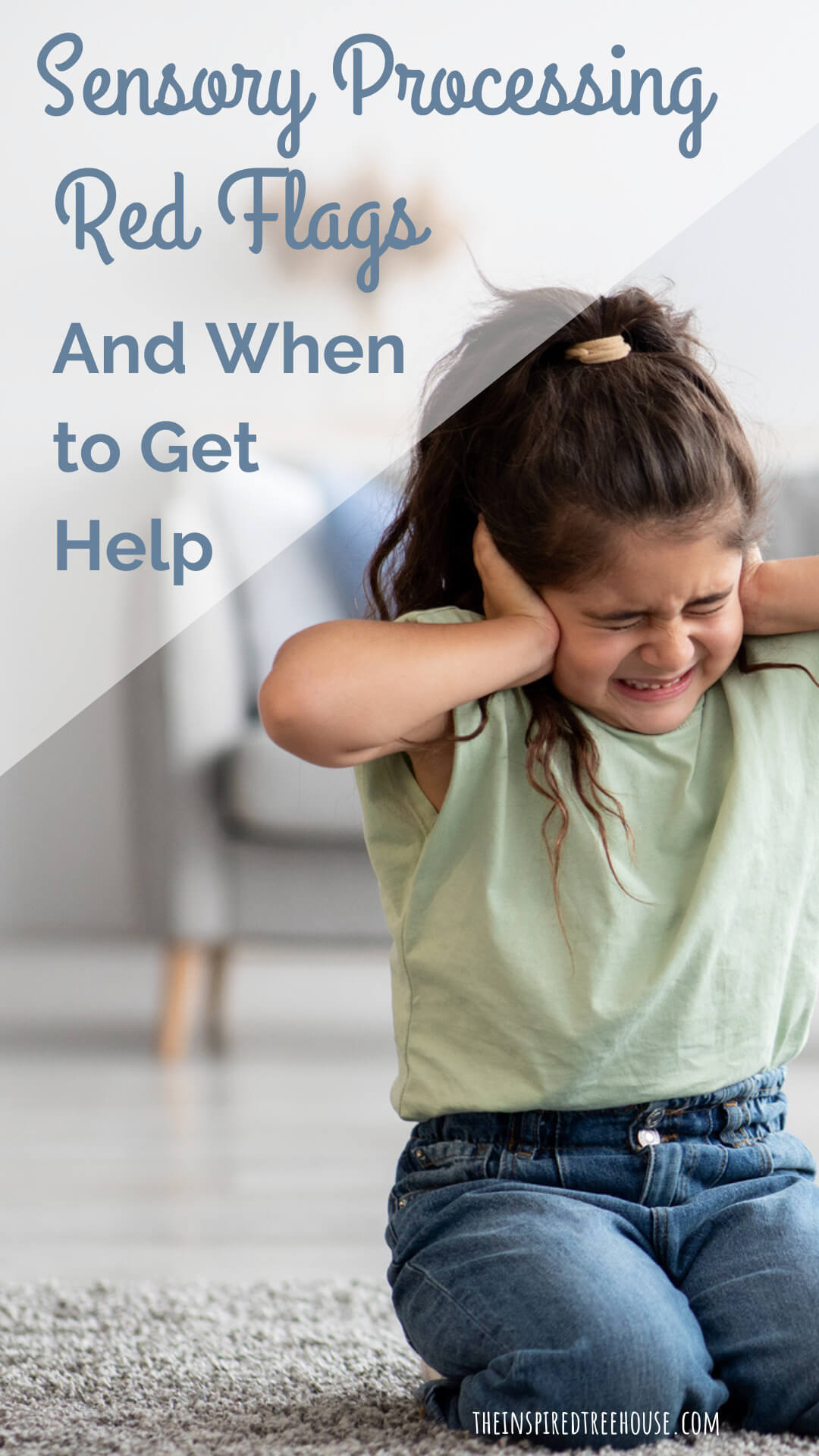These sensory red flags may indicate that a child needs extra help or support to manage sensory processing concerns.
*This post contains affiliate links.
We’ve been working hard over the last year to bring you monthly posts about sensory processing and how the sensory systems relate to child development.
Each month, we’ve written a post about one of the sensory systems from our point of view as pediatric therapists and our friend Dayna, from Lemon Lime Adventures, has written a post about the same sensory system from her perspective as an educator and a mom of a child with sensory processing disorder.
In our series of resources about sensory processing, we’ve written about:
the tactile system,
the auditory system,
the proprioceptive system,
the vestibular system,
the oral sensory system, and
the visual system.
Today, as a part of an even bigger series with over 40 other bloggers called Decoding Everyday Kid Behaviors, we’ll discuss sensory red flags – behaviors related to sensory integration that might indicate that it’s time to get some expert advice to help support your child’s sensory needs.
Read to the end of this post to grab the Sensory Ideas for Small Spaces freebie!

RISE With Sensory Course
Are you ready to learn powerful sensory strategies to support kids’ sensory needs so they can RISE to their full potential?
Whether you’re a parent or a professional, this course is for you!
The RISE With Sensory Course is This class is AOTA approved for 7 hours (.7 CEU) and is the perfect starting point for new therapists, or refresher for experienced therapists.
Looking for a streamlined approach for working with kids with sensory concerns and for communicating clearly with parents and caregivers about sensory processing?
Click here to learn more!
Sensory Red Flags
We all have our own unique preferences and aversions when it comes to the way perceive the sensory information in our surroundings. But for some children, these preferences and aversions can become problematic, leading to difficulty participating in everyday activities and routines.
The following behaviors are sensory red flags and may indicate that a child requires additional support.
Read to the end of this post to grab the Sensory Ideas for Small Spaces freebie!
The Auditory System
-Extreme reactions (crying, screaming, running away) or significant difficulty with tolerating sudden noises, specific noises, crowds, and/or loud noises
-Startling easily, becoming agitated in noisy environments
-Distracted by all sounds
-Covering ears even at the anticipation of a sound or in uncertain/unfamiliar environments
-Difficulty responding to and following directions presented verbally
-Making constant noises (singing, humming, clicking)
-Not responding when name is called
The Vestibular System
-Constantly moving, fidgeting, spinning around
-Fearful of movement (e.g. stairs, playground equipment, swings)
-Uncoordinated, clumsy, bumping into things, falling, difficulty learning new motor tasks
-Slumping, slouching, leaning on desk or on walls when walking in the hallway
-Difficulty with maintaining balance when walking and during gross motor play
The Proprioceptive System
-Coloring/writing with heavy pressure or not enough pressure
-Pushing others, playing aggressively, constant roughhousing
-Doing everything with 100% force, not grading the force of movements adequately
-Crashing/falling on the floor constantly throughout the day
-Difficulty with body awareness (runs into objects/others)
-Appearing tired or sluggish (slumping and leaning)
The Visual System
-Easily distracted by surrounding visual stimuli (e.g. posters or art on the walls, activity in the room).
-Difficulty visually focusing on a task like coloring a picture or completing a worksheet
-Not noticing surroundings unless things are pointed out
-Staring intently at objects or becoming fixated on visual stimuli (e.g. fans, lights)
-Arranging objects in a specific way repeatedly (e.g. lining objects up, stacking objects up)
The Oral Sensory System
-Very reluctant to trying new foods, extremely picky eater
-Extreme resistance to oral sensory experiences like brushing teeth
-Refusal to use utensils to eat
-Choking or gagging during eating or brushing teeth
-Constant biting, chewing on, or mouthing hands, clothing, fingers, toys, and other objects
-Biting others
-Constantly making mouth noises (clicking, buzzing, humming)
-Stuffing mouth with food at mealtimes
-Difficulty with chewing or drinking from a cup or straw
The Tactile System
-Avoiding getting hands or face messy, avoiding messy play
-Avoiding activities like fingerpainting, play dough, and eating messy foods
-Extreme reactions or tantrums during toothbrushing, bathing, haircuts, dressing
-Difficulty tolerating certain clothing, textures on skin (e.g. tags on clothing)
-Needing to touch everything and everyone (e.g. craving hugs and closeness with others, fidgeting with objects, seeking out textures and touch experiences)
When to Get Help
It’s time to get some help if your child is experiencing any of the behaviors described above (or behaviors in multiple sensory areas) to such a significant degree that it impacts his or her ability to:
-Interact with others
-Participate successfully at school
-Go out in public
-Tolerate basic self care and grooming experiences (bath/shower, brushing teeth, getting dressed)
-Attend family and other social events
-Eat a healthy diet and maintain a healthy weight
-Get an adequate amount of sleep
Talk to your pediatrician about getting a referral to an occupational therapist who is trained to evaluate children’s specific sensory needs, provide therapeutic intervention to address them, and give you sensory input, strategies and suggestions to use at home.
Sensory Processing Resources
RISE With Sensory Course from Your Kids Table – This is our favorite course about sensory processing! Perfect for therapists, parents, teachers, and anyone else who works or lives with kids with sensory processing needs. This course is an AOTA certified course, approved for .7 CEUs. CLICK HERE for more information!
Sensory Processing Info & Quick Wins Handout Pack – This pack of 7 black and white and 7 full color handouts is the perfect resource for any therapist or professional who is looking for a simple way to educate others about sensory processing and the sensory systems.
Whether you are a parent, educator, caregiver, or therapist, Sensory Processing 101 is a starting point to gain a better understanding of sensory processing and the body’s sensory systems.


Latest posts by Claire Heffron (see all)
- Pro Tips for Conquering Toddler Separation Anxiety - April 25, 2024
- Cute Zipper Bags for Therapists - April 18, 2024
- Fairy Tale Games and Toys - April 12, 2024


[…] Sensory Integration Red Flags: When to Get Help – The Inspired Treehouse […]